

A refrigerator can typically keep food safe for up to four hours without power if the door remains closed. Freezers will hold their temperature for 24 to 48 hours, depending on how full they are and if the door remains shut. After these crucial hours, food safety becomes a concern, and measures should be taken to minimize food spoilage and potential health risks.
Quick Summary
When a power outage strikes, knowing how long your refrigerator will keep your food safe is essential. At Setting King, we emphasize that preparation and understanding your refrigerator’s capabilities can significantly mitigate the hassle of managing food safety during these outages. Here’s everything you need to grasp about your refrigerator and freezer’s resilience when the power goes off.
The ability of a refrigerator or freezer to maintain its temperature without power depends on several factors including:
To extend the time your refrigeration units maintain a safe temperature during a power outage, consider the following tips:
When power returns, it’s vital to ensure the safety of your food:
Our trusted advice at Setting King is to always be prepared for a power outage by understanding and optimizing how long your refrigerator and freezer can sustain safe temperatures. This knowledge not only helps in maintaining food safety but also assists in planning and managing resources during unexpected outages. Equip your refrigeration units with thermometers, keep the doors closed during outages, and prepare ice blocks in advance. These steps can significantly extend the period your food remains safe to consume without power.
Remember, the guidelines provided are general, and various factors such as the make and model of your refrigerator, environmental conditions, and the state of the door seal can affect performance. Stay informed, stay prepared, and you’ll navigate power outages with minimal impact on your food’s safety and quality.